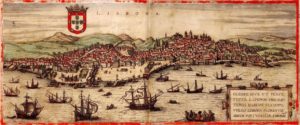In the Middle Ages, maritime conflict has developed hand in hand with international trade. Over time, specific institutions were established to address disputes arising from violence or mishap at sea and in coastal areas. Recent historiography emphasises that late-medieval merchants, together with consuetudinary law and common legal practices, relied on the legal autonomy of municipal governments to resolve maritime and commercial conflicts. For highly urbanised areas like the Low Countries, it has been argued that urban legal autonomy played a decisive role in inter-urban competition to attract foreign merchants, thus stimulating economic growth in the most successful cities.
However, in other regions of Europe, on the Iberian Peninsula and in England for instance, the situation was different. Certain cities – like Lisbon and London – rose to dominance without facing competition from other cities. Some of these cities were highly dependent, from a judicial standpoint, from the crown’s intricate bureaucracy. So, how were maritime conflicts resolved in port cities under the authority and control of central governments or the crown? And how to explain that places not involved in urban competition, which sometimes lacked autonomy in judicial matters, could economically expand? In addition, the role of central governments in highly urbanised regions, including the Italian city states and the Low Countries, will also be discussed from the perspective of maritime conflict management. This seminar on Central Governments and the Resolution of Maritime Conflicts, 1200–1600 aims at exploring these questions in a broad, comparative perspective, by looking at how disputes were managed and settled both in Atlantic Europe, more specifically in the Iberian Peninsula, and around the Mediterranean in the later Middle Ages. The seminar will include invited keynote presentations by European scholars. The full programme will soon be published online.
Paper proposals
We welcome paper proposals for a twenty-minute presentation on topics related to the call. We encourage papers related to merchant conflicts and their resolution in central courts, legal strategies, merchants and governments’ diplomatic exchanges, among other approaches.
Please submit your paper proposal (500 words) and a short curriculum (250 words) by 15 June 2018 to Flávio Miranda (F.Miranda@fcsh.unl.pt). While composing your message, please write ‘CGMC2018 application’ in the subject field. Please don’t forget to include your name, institution, current position (PhD candidate, post-doc, lecturer…), and e-mail address in your short CV.
There will be a registration fee of €45 to cover meals (lunch, dinner, and coffee-breaks). The participant should be able to cover his/her own travel expenses and accommodation.
Select speakers will be invited to join us in submitting their work for publication in an edited volume in a renowned academic publisher.
Official language
Paper proposals and presentations should be in English.
Dates and deadlines
15 June 2018 – Call for papers closes.
1 September 2018 – Registration opens.
30 September 2018 – Registration ends.
25 October 2018 – Conference begins.
Registration
Registration will be open from 1 September to 30 September 2018.
Organisers
Amélia Aguiar Andrade
Flávio Miranda
Louis Sicking
This seminar on the economic history of late medieval Europe is organised by the Instituto de Estudos Medievais (IEM) of the FCSH-Nova University of Lisbon, as part of the international research project “Maritime Conflict Management in Atlantic Europe, 1200-1600” (NWO, Vrije Universiteit Amsterdam, U. Leiden). Partner institutions: U. La Rochelle (France), U. Cantabria, U. La Laguna (Spain).
Full PDF can be seen 2018.03.15 Lisbon CGMC cfp











Comments are closed.